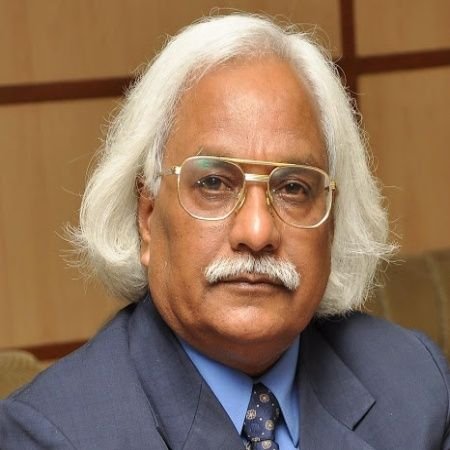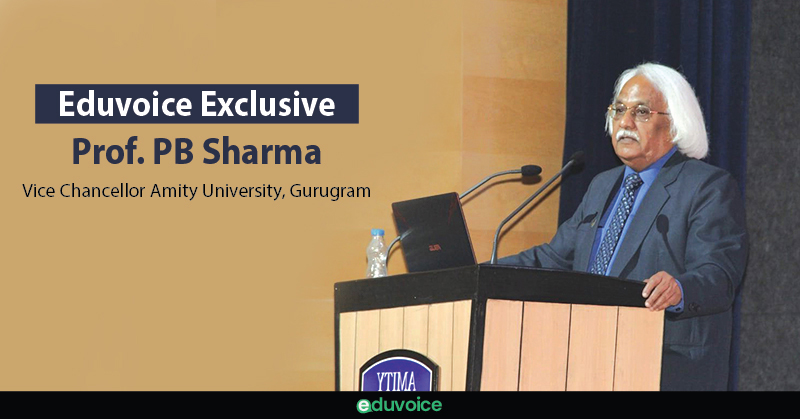Eduvoice exclusive interview

Prof. P.B. Sharma
Vice-Chancellor, Amity University, Gurgaon
Former Vice-Chancellor, Delhi Technological University (DTU)
Current President of the Association Of Indian Universities
Has a career spanning 44 years of experience in teaching and research
introduction
Critical Thinking and practical approach have been the requirement in the industry from the very beginning. However, in our education system, students are not asked to focus on these traits and are somewhat looped around in the bookish knowledge and test papers.
This time we have with us, Visionary Educationist Prof PB Sharma the Founder Vice-Chancellor of India’s Leading Technological University, DTU, currently is Vice-Chancellor of Amity Gurugram and President of Association of Indian Universities, sharing his opinions on these issues.

Sujata Mehta
Graduates who are passing out from colleges. We all know they are not very critical thinkers. So what’s your take on it? What are the reasons and how we can resolve them?

Dr. P.B. Sharma
I completely agree with that. The education system in our country is based on classroom teaching, where the teachers come, give lectures, students take notes and the class is dismissed. In this process, curiosity and ability required in the industry cannot be created.
We as educationists, have to inspire, motivate, and excite students to think critically and move towards innovation, and this is possible only through dialogue and not by a stand-alone speech given by professors.
However, unfortunately, for a very long time, education in India has remained a “Guru-shishya parampara” whereby their students are treated as your disciples and teachers think that they are Guru Maharaj and everybody will come and listen to them and go, but now it has to change.
In my opinion, the teachers should provide all the necessary reading material to the students before the lectures, and consume lectures by having discussions and debates on the aspects of that topic. This will attract more students and the management will be able to fill the gaps between teachers and students.
Education in the west is extremely practical based and not bounded by the books and exam papers. Curiosity, critical thinking, and applied knowledge are much more important than what is written in the paragraphs of the books.
The education industry of India requires a major remodel, we have to understand the need for dialogue in the class to create students who are more industry-ready having a critical approach.
We have to reinvent the idea of teaching-learning in the country and create more space in our curriculums based on what is required by the industry and what the students want to learn as opposed to ‘what was taught last year’. So, the students have enough space to interact and to generate that vital curiosity, which should always be the hallmark of learning.
SUBSCRIBE TO OUR NEWSLETTER
Get latest updates about our Exclusive Interviews, News, Articles on Higher Education Sector.

Sujata Mehta
As you mentioned and we all know we have a very rich culture and heritage, especially in education. Do you think we should learn and incorporate our Vedas into the present education system

Dr. P.B. Sharma
Vedas are an extremely important part of heritage, culture, and civilization. They were created around the idea of learning and cultivation of knowledge. One of the three chapters of Yajurveda is Taittirīya Upanishad, which says, “Vigyan dev Sarah, Brahma dev pashyati”, which means that science and education should have the highest respect, and one who gives education that respect and develops curiosity can reach the “absolute” position.
Our Vedic civilization which made India so famous throughout the world for its quest for knowledge, a quest for learning, their highest level of attention is being given to the cultivation of knowledge as well as the cultivation of science and technology.
Such curiosity allowed India to be one of the most prosperous habitats on the planet, for several thousand, rather millions of years. However, we have killed curiosity to a great extent as we are becoming more and more dependent on foreign countries for the import of technology.
We need to understand that the world has gone much further in respect of the cultivation of new knowledge, new technologies, and new know-how because they have allowed inspired minds to flourish rather restricting them based on the number of years they spent in school and so on.
So I think the time has come. We in India must recognize the value and worth of flexibility and put in a tremendous amount of space for students to learn, what they want to learn and allow them to grow taller in their interest areas. So that we can create that kind of aura that India wants, and the sensibility in the Vedas can help provide the students with kind of impactful thinking.

Sujata Mehta
Everyone is aware of the placement drives in colleges and universities, and how they’re focused on a set percentage and not particularly the skill set of the student. So, what is your take on that, and what can be done to improve on this fact?

Dr. P.B. Sharma
People in our country are very gravitated toward the idea of brands. Whether it is in clothes or shoes, and now even in institutes and students. This attraction of ‘branded’ students has led to a major setback in the education system, as recruiters look at golden degrees and not necessarily on the capabilities.
Therefore, I think it’s very important for recruiters today to focus their attention on students with inspired minds having a tremendous amount of ability to work in their industry and contribute effectively to the growth and foster the quality and relevance of the kind that creates a competitive age for the industry today.
So I think the industry should be looking for innovative, inspired minds and people with capabilities having the right attitude and character rather than fancy degrees. Other than this, I also want to advise the younger student community that, when they come to the university, they should understand that they are entering the world as professionals where knowledge, skills, attitude, character, and capabilities will matter.
Hence, they should be utilizing their time in the university system to get to the best of their knowledge, which they can get from their teachers and ask the limits of that knowledge by their engagement in various projects and assignments.
It is also important to develop a personality having a positive attitude with which you are in a position to give something to the society rather than all the time crying that, “I should get this, I should get that, I’m getting a degree”.
You may have anything, but what you are giving back to society ultimately, is what that matters, and I think that kind of spirit of giving needs to be cultivated in our students.

Sujata Mehta
In the current scenario, it is often seen that the people not taking teaching as a career choice resulting in that, our teachers are not necessarily as devoted as they should be. So, what is your opinion on that?

Dr. P.B Sharma
It is no doubt that the career of teachers has drifted miles away from what it was earlier. In earlier times, teachers had a spirit of giving and spirit of sacrificing for their students. Their concern was how they can help the students on their journey of imparting knowledge, not about their salaries or incentives.
They used to live a life of humility and humbleness and were only concerned about giving the very best of their knowledge and mentoring students to rise to the highest level of enlightenment.
Now, all this had changed over the years because we came to the new age of independence, careers became more important and teachers also found that there are better career prospects for the bright younger students in their industry and corporates.
So I think the teaching community has to understand the importance of the teaching profession, in my opinion. Those inspired minds who have a desire to get back to their society, their ability to nurture new knowledge and cultivate the inspired minds of the youngsters and take them to the new frontiers of knowledge.
They should come to teaching and those who want a lucrative career want to get a good house and car and a pretty salary shouldn’t come into this profession.

Sujata Mehta
Do you think that lower salaries and lack of respect are leading people to not take up teaching as a profession?

Dr. P.B. Sharma
In my opinion, good teachers are respected and honored highly everywhere. However, the teachers who are not very involved in the grooming and nurturing of students are not respected as highly. The respect for a good teacher, in my opinion, is already there.
In Vedas also, it has been said very clearly that only those teachers whose conduct and character is such that it should be emulated much to be taken seriously.
We need to inspire such teachers so that they rise to the requirement of understanding that the teaching profession is a highly valued profession because here you are creating preachers, you are creating a bright future of the nation. So teaching is all about enthusiasm, interest, and commitment– once the teachers commit to this mantra, then I am sure that every teacher will be respected in the society.

Sujata Mehta
According to you, what can be the impact of COVID-19 on our education system?

Dr. P.B. Sharma
This is a very difficult time for everyone and every industry. However, this period has provided us with an opportunity to open up our horizons and find a better system that can revolutionize the education industry. This is certainly a wake-up call for everyone, that people are taking their natural resources so lightly. This is a chance to pull it back together and make sure that we respect the resources provided by earth effectively.
Another major impact is virtual learning. People are using various platforms and domains to interact and work, this has led to the creation of a virtual world. This virtual world might be the answer to problems like air pollution caused by traveling, noise pollution, and more.
People have begun to utilize technology for a more positive and better cause. Home delivery is taking place now you are more leaning towards the new world which lies inside our computers.
Sujata Mehta: In the need of information and technology, India is not the most developed nation. So, do you think that lack of technological resources can host an issue in the post-COVID time?
Prof. P.B. Sharma: I think that the policymakers and planners and those who are in the government of our country must now understand the power of connectivity and therefore the much greater investment is required and improving the connectivity, bandwidth, and bringing 5G, and enhancing the speed of the transaction.
And I think we are moving now much, much faster and let us pray that in the years to come, a much greater investment on connectivity network on quality of the network, on cybersecurity, the security of the network, on the integrity of information and on protecting the privacy of the users is very much important. Much greater investment in the suspect required.
The new India, which wants to create $5 trillion by 2024 will turn into reality. In my opinion, the loss which we have suffered during COVID time can be very well made by providing India by capitalizing opportunity and utilizing connectivity and technology for announcing our businesses and the efficacy of our services, not only in front of our own people but people around the world.







